Alfred Daniel Wintle, English Rascal and Hero
Alfred Daniel Wintle (known throughout most of his life as “AD”) was born in Ukraine in 1897. His father John was an English diplomat who was posted there along with his wife Teresa, Wintle’s mother. The family spent some time in Romania when AD was quite young, before eventually settling in Dunkirk. This unusual upbringing left AD with two main gifts – a great facility for languages (especially French), and a tremendous belief in his own Englishness and the superiority that gave him. Though it wasn’t until he was seven years old that he actually visited England for the first time, when his parents went there on holiday to visit relatives, AD was never for a moment in doubt of his own identity.
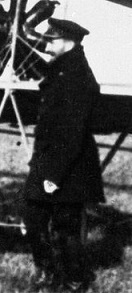
AD was 16 years old when World War I broke out. Dunkirk was close to the Belgian border and so was an important spot early in the war as the Germans tried to outflank the allied French and British forces. Young AD was most interested in the armoured car division led by Commander Charles Samson – the first of its type. Samson was technically a navy man, but was at this point part of the Royal Naval Air Squadron which would become, after the war, the RAF. Like his airplanes, his armoured cars were used to harry the advancing Germans, disrupt their reconaissance and generally delay them as much as possible. This was a vital part of what became known as the “Race to the Sea”, the attempt by the Germans to outflank the rapidly developing defensive trenches. AD later described himself as “unofficially attached” to Samson’s squadron, which seems to have meant that he tagged along and saw them in action – his first taste of military life.
With Dunkirk becoming a little hot, AD’s father agreed that he could enter Woolwich Royal Academy in 1915 to train as an officer. AD graduated the course in record time and was soon sent out to the front lines as a lieutenant. He was left under little illusions as to the brutality of the war he was entering – on his first night there he was introduced to the sergeant of his unit, only for the man twenty minutes later to be killed by a stray artillery explosion that left his blood spattered across AD. The young man was initially terrified, but “within thirty seconds I was able to become again an Englishman of action”.
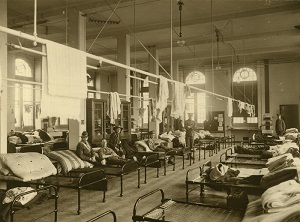
AD spent the next year and a half on the front and gained a reputation for daring heroics and narrow escapes. The narrowest came in 1917 at Ypres when he set off an unexploded artillery shell while helping carry a captured gun back to the British lines. The explosion cost him several fingers, the full use of one of his legs and most of his eyesight. His left eye was gone, while his right eye was so badly damaged he was left using a monocle for the rest of his life. Naturally he was sent back to England to recuperate, and naturally he was left utterly furious at the idea. He claimed to have tried to escape from the military hospital several times, once by dressing up as a nurse. In this he was foiled by his monocle and moustache, neither of which went with his assumed persona.
Eventually AD did manage to get back to the front, with the aid of one of his father’s government contact. The war was nearly over at the point, but he still managed to earn himself a Military Cross for his heroism on the 4th November 1918 when he singlehandedly captured thirty five German prisoners and captured some important intelligence. It’s perhaps a sign of the type of war he fought that he said he honestly couldn’t figure out which incident they were talking about. A week later was the Armistice. AD’s attitude towards the whole thing can be summed up in his diary entries for the following year:
June 19th 1919: “Great War peace signed at last.”
June 20th 1919: “I declare private war on Germany.”
Despite this, though, AD remained in the Army. He served in Ireland during the rebellious years after the war, and also served some time in India. Though he had begun the war in the Artillery, he had ended it in the First Royal Dragoons – one of the few remaining heavy cavalry units in the British Army. It was one of those horses landing on him after a fall and breaking his leg that he found himself in a hospital with the trumpeter for the Dragoons, a sixteen year old boy named Cedric Mays who was seriously ill. AD went to visit Cedric and gave the young man a severe dressing down, telling him that no Dragoon was permitted to die in bed and ordering him to get better at once. Cedric soon made a full recovery, as he didn’t honestly feel he had any alternative option.
The same hospital stay led AD into discovering a new talent as an author. In his own words, “I got bored of sitting reading books and decided to write one instead”. The book was called The Emancipation of Ambrose, a comedy about a hapless civil servant who is mistaken by a bunch of incompetent spies for an international assassin. AD published it under the pen name of “Michael Cobb”, as he thought it might be considered undignified for an officer in the Dragoons to write something so lighthearted. The novel wasn’t well known in England but became a hit on the Continent. In 1936 it was even made into a film at Pinewood Studios, under the new title of Wolf’s Clothing. [1]
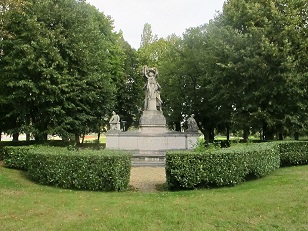
AD enjoyed writing, and went on to write several more books. He dabbled in non-fiction but soon decided he preferred fiction. He wrote a couple of historical novels (one based on the life of Aesop and another set during the fall of Troy) as well as some other comedic thrillers in the vein of “Ambrose”. He soon discarded the Cobb pseudonym and started putting his own name on them. Perhaps this was prompted by the four years he spent teaching in France, where writers were given a great deal more respect than they were in England. He was a guest lecturer in the military college there, with his native-level French. During this time he made friends with several French air force officers, a though the Dragoons were not an aerial unit AD himself was well versed in aerial warfare. This might have been because of his exploits with Commander Samson during the war, but it blossomed into a grasp of the new trade that impressed several people he had worked with in Army Intelligence (another of his interbellum postings). These French friends were significant, however, due to an agreement AD reached with some of them to plan for what they saw as inevitable.
Unlike many, AD wasn’t blind to what was on the horizon during the 1930s. He had lived through the rising tension that led to one war, and he knew exactly what the remilitarisation of Germany would lead to. He was also painfully aware from his time there that France was on the verge of civil war, and when (not if) Germany invaded then the French military would not be able to present a unified response. His contacts were (like him) veterans of the first Great War, and had no intention of surrendering to Germany. In that case they planned to lead their squadrons over to England, where AD promised to ensure them safe haven. It was an audacious plan, though one that would in the end prove to be based more on optimism than anything else.
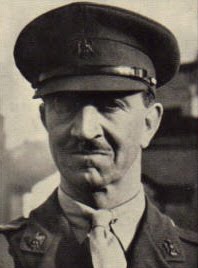
When war broke out, AD was deeply annoyed that his poor eyesight saw him stuck in a desk job in London. He was placed back in intelligence, where he became friends with Reginald Victor “RV” Jones (the head of science for the RAF) and was involved in the early stages of the “Battle of the Beams” (the ongoing efforts by British air defences to jam the German guidance systems, and the German efforts to develop new methods to overcome this). When the French surrendered in June of 1940 though, AD was driven into action. He immediately headed to an airbase near London to commandeer an airplane and rally his old friends in France. He dispatched an order to the airbase using an RAF commodore’s named to have a plane ready to take him to Bordeaux, but unfortunately for AD the commodore in question was at the airbase at the time. He was waiting for AD when he arrrived and demanded to know what he was doing, which led AD to pull a gun. The commodore later claimed that AD threatened to shoot him, but AD himself said that he threatened instead to shoot off the rest of his own left hand in order to prove how serious he was. Neither of these happened though, as AD was disarmed by the commodore’s guards and placed under arrest.
Given the poor state of repair of the French Air Force and the casualties they’d suffered in the Battle of France it’s unlikely that AD’s plan would ever have made a difference, but he clearly felt that he had to try. After his arest AD was put under guard on a train back to London. He didn’t resist – in fact, entirely the opposite. When the young guard turned out to have lost his arrest warrant AD left him in the carriage and went out into the train station to get a new one, and then signed it himself as the most senior officer present. At the Tower of London he initially had a frosty reception since the guards naturally assumed he was a traitor or spy. Once they discovered his actual crime, they immediately warmed up to him. In fact, in his own words:
My cell became the most popular meeting place in the garrison and I was as well cared for as if I had been at the Ritz… Visitors dropped in at intervals, usually bringing along bottles which were uncorked on the spot. I don’t recall that any of them contained any tea… After a few days of settling in, I was surprised to find that – as a way of life- being a prisoner in the Tower of London had its points.

AD Wintle was officially brought to trial on three charges. Inter-service rivalry played a part in both the charges on the docket and in the conduct of the trial. The charges were brought by the RAF but as an Army officer AD was tried by an Army court who were much less disposed to take them seriously. The first charge was of malingering by feigning defective eyesight to avoid active duty. This was clearly put on the docket by either a vindictive RAF or by someone entirely umfamiliar with AD’s temperament, but a quick medical examination soon saw it dismissed. Another charge was of threatening to shoot the RAF officer, which AD countered by reading a list of people who he also felt deserved to be shot. The list was clearly topical enough that the prosecution decided they didn’t want too much of it in court records. AD reached the sixth name (the secretary of state for war) before being told that those charges were also being dropped. In the end the only charge he faced was that of assaulting the RAF commodore, for which AD received a formal reprimand but nothing more.
In the aftermath of the trial it was clearly felt that AD would be better out of London, so he was sent to Cairo to rejoin the 1st Royal Dragoons. They were fighting against the Vichy French forces in the Middle East, where the new tactical importance of oil made the area a significant battlefield. In early 1941 a coup in Iraq ousted the pro-British government, and the new ruler appealed to the Axis for help. This came in the form of a small squadron of Luftwaffe and Vichy ground forces. In May the British invaded and restored the previous government, and in June they carried the battle through to the Vichy-controlled Syria and Lebanon. By mid-July the Vichy forces surrendered, and control over the area was granted to the Free French who restored the independence of the local governments. This left AD (who had been in charge of intelligence for the Dragoons) at a loose end, until a job came up that seemed perfect for him – infiltrate Vichy France and assess the condition of the POWs being held in camps there. This he would succeed in doing, though not quite as he might have hoped to do.
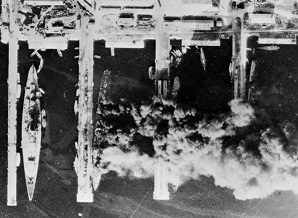
Despite the jibes of later writers that “a one legged man wearing a monocle and carrying an umbrella made for an unconvincing Frenchman”, AD’s ability to speak French like a native and his knowledge of the country made it unlikely that he would be discovered in his guise as a displaced schoolteacher. However that counted for little when his contact in the Resistance turned out to be a traitor who betrayed him to the Vichy authorities. AD was arrested, but was lucky enough not to be executed out of hand as a spy. Instead he was sent to a prison camp near Toulon and told his war was over. They didn’t realise they were dealing with AD Wintle, who was not a man who would ever be likely to give up.
AD began his life in the prison camp by informing the commandant (one Maurice Molia) of his intention to escape. He then told Molia that he and his men were traitors, and that their general standard of uniform, cleanliness, and deportment was far below what an English officer would expect in his guards. This earned him solitary confinement, but that didn’t bother him. On his first escape attempt, he was caught and returned to the camp. This also didn’t break him, though he later admitted that he expected at any time to be taken out and shot. After a year in the camp and several more failed escape attempts, AD decided (mostly out of boredom but partially out of disgust at the unshaven and slovenly guards, and partially to try and shame some of the guards into resistance) to go on hunger strike until he was allowed to conduct inspections on the guards in the camp.
His hunger strike lasted a fortnight before Molia finally relented and told him he would be allowed to carry out his inspections. AD thanked him and told him that since it was now seven thirty and he normally dined at seven he would take his first meal the following morning. After he had regained his strength (and carried out several inspections that incidentally gave him a good chance to reconnoitre the camp) he made one more escape attempt – sawing through a cell bar with one of his bedsprings and dropping onto a cart that was leaving the camp. This time he made it to the Spanish border and safety. Though he didn’t know it at the time, he’d had exactly the effect he’d hoped. Many years later he was reunited with Maurice Molia who told him that after his escape, Maurice and the entire camp had decided to free all the prisoners, desert from the Vichy army, and join the Resistance.
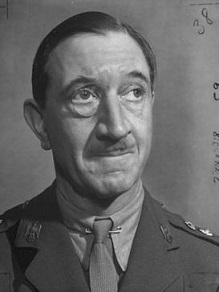
AD spent the rest of the war at a desk in London. It was during this enforced downtime that he married his wife, Dora. After peace was declared he retired with full pay for disability. He decided to try going into politics, campaigning in the 1945 election as the Liberal MP for Norwood on a platform of being “the first man to enter Parliament with good intentions since Guy Fawkes”. One memorable incident on the campaign trail was when he decided to visit his friend RV Jones. AD Wintle should never, with his temperament and eyesight, been allowed behind the wheel of an automobile and this was illustrated when he managed to drive straight through the front of RV’s house and park in his living room. AD then got out of his car and saw Mrs Jones (who had been sitting in the living room at the time and was in somewhat of a state of shock). AD apologised and prescribed sherry for her nerves, which he then went off to the pub to get.
Perhaps fortunately for Parliament, AD failed to be elected as an MP (though he did manage to retain his deposit). This left him at a loose end and he spent the next years in an unbearably restless retirement. He applied for a job at NATO but was refused and told it was because his dress was “too military”. He wrote, of course, and this was when most of his books were written. He also wrote to the papers, and after his death the editor of the Times published one letter from AD which he had decided not to publish at the time but which he had kept as it was one of his favourite letters he’d ever received.
Sir,
I have just written you a long letter.
On reading it over, I have thrown it into the waste paper basket.
Hoping this will meet with your approval,I am, Sir,
Your obedient Servant,
AD Wintle
The clarion call for AD Wintle’s final great battle came in 1947 with the death of his second cousin Kitty Wells at the age of 76. Kitty had always been somewhat eccentric and disconnected from the world, and reportedly was only vaguely aware of the existence of either the first or second World Wars despite living through bombing raids on both occasions. Her most notable habit was of writing letters to herself enclosing her bus tickets and receipts, which she would later receive and read with great interest in order to find out what she’d been up to. Kitty was well off, due to some money she had inherited, so she was able to live comfortably despite her eccentricities. Naturally as she grew older she became incapable of taking care of herself, so AD’s sister Marjorie who had always been good friends with Kitty became her companion and live-in carer. A will that Marjorie had witnessed several years earlier had left her with an income of £260 a year – a reasonable pension in those days, and a sign of Kitty’s esteem for her. However she was shocked to find after Kitty’s death that this had been reduced to only £40 by a new will she had never seen. The new will left £600 per year to Marjorie’s first cousin Millie (who was her closest relative) but the bulk of the estate, £65,000 out of £115,000, went to the residuary legatee – the man who had drawn up the new will, Kitty’s lawyer Frederick Nye.
It’s a common trope in detective fiction for the role of residuary legatee (the person who receives what’s left over after an estate has been divided up into specific bequests) to be abused in order to defraud the person who drew up the will. [2] It’s pretty clear that’s exactly what happened in this case. The new will was witnessed by Nye’s two clerks, and it’s certain that if Kitty had understood its implications she would never have signed it. However as it was Nye was pretty safe from challenge – the only one who was legally entitled to challenge his role as residuary legatee was the next of kin, Millie. The original will left the residue to charity, so Millie wasn’t really interested in challenging it especially as she hadn’t got on with Kitty and Marjorie. However two flaws soon became apparent in Nye’s plan. The first was in 1948 when Millie died intestate and her claim passed to *her* next of kin (some cousins). The second was AD Wintle.
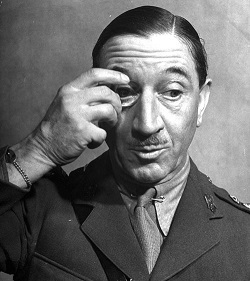
In order to appeal the will AD needed one of those cousins to sign over their interest to him, but initially none of them were willing to do so. AD wrote to everyone in the legal profession he could think of to try to find some way to get things moving, but though all agreed the case was scandalous none were willing to do anything. So AD decided in 1955 that the only thing to do was to make the scandal impossible to ignore. His method of doing this was typically direct. He invited Frederick Nye to a private meeting, then as soon as they were alone turned on the hapless lawyer and ordered him to remove his trousers. The terrified Nye did so, and AD took two pictures of the trouserless scoundrel before throwing him out onto the street – still without his trousers. Nye went to the police while AD went to the press with the pictures and with his story. The end result was that AD received a six month sentence in Wormwood Scrubs; but he also received a great deal of publicity for his case. Enough for one of the cousins to be shamed into giving him a nominal interest in the estate. It was only a formality – AD didn’t stand to win any money from the case. But it was enough to get Nye into a courtroom, and to get the battle started.
AD’s legal team had two possible options for challenging the will. They could appeal on ground of knowledge and approval; in other words claiming that Kitty hadn’t been fully informed on what the will entailed. Or they could appeal on fraud; alleging that Nye had deliberately misled her. Both had their pros and cons, but they decided in the end to appeal on the knowledge grounds. They put their case before a jury and an openly unsympathetic judge, who seemed to take AD’s attack on the legal profession personally. He summed up against them and the jury found unanimously for Nye. The judge refused to award AD costs from the estate saying that as he had wanted to drag Nye into court and expose him “he should pay for the pleasure”.
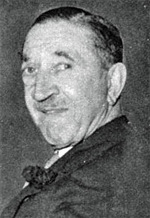
AD was no longer able to afford a legal team, so he was forced to dismiss them. He did have an unexpected asset, though. Cedric Mays, the trumpeter he had ordered not to die in hospital, was now a civil servant with a law degree. He was hardly a lawyer, but he proved a solid friend and a good source of knowledge for AD to strategise with. Five months after the first court case he and Mays put their case against the first verdict to the Court of Appeals. Their ground was that the original judge had misdirected the jury in his summing up due to his dislike of AD. Of the three judges on the panel, two ruled against them and one ruled in favour. They had lost, but the lack of unanimity gave them grounds for one final appeal to the House of Lords. In 1958 he argued his case to the twelve “Law Lords” who served as England’s last court of appeal. They returned a unanimous verdict – the judge had misdirected the jury. The headline in the Times the next day was:
Cavalry Officer Jumps Last Fence To Win
In retrospect it’s been argued that the Law Lords’ ruling wasn’t exactly legally sound, and that their political senses led them to bend the rules in order to achieve a verdict that satisfied justice. [3] Technically their decision only entitled AD to a fresh trial, but Nye withdrew from the case and didn’t contest setting aside the disputed will and restoring the original. This may have been a last ditch attempt to save his career, since the dreadful publicity had left him a pariah from the rest of the legal profession. They had closed ranks to protect their reputation when AD had accused him, but now that every newspaper in the land was baying for Nye’s blood they closed ranks against him. Nye was struck off the roll of solicitors, and the Law Society changed their rules to ensure that any lawyer who did the same would be automatically struck off in future. In a way, that was the ultimate recognition of AD’s success.
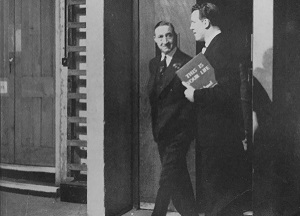
AD Wintle’s historic victory in the House of Lords made him the toast of the land. His previous wartime heroics were much publicised, and he became for many the epitome of the modern Englishman. He was invited onto Desert Island Discs where his preferred book was a large blank notebook, so that he could occupy his time writing. The prospect of filling up the space in the book didn’t faze him, as he was confident he would have escaped the island long before that happened. He also appeared on This Is Your Life, where he was reunited with his old jailer Maurice Molia. It was now that he learned that he had inspired Molia and his men into switching sides and fighting for their country against the Nazis and their allies, something which pleased the old soldier perhaps more than anything else.
In an interview in 1961 AD told the writer Robert Littell
“In writing about me, be sparing of the past tense. Much remains to do.”
In truth, though, this had been his final battle. His last published book (The Club) came out the same year as he gave that interview, and for the next few years he gave himself over to work on his magnum opus – his autobiography. He was still working on it in 1966 when he passed away, and his friend the military author Alistair Revie took his million words of prose and organised them for publication. The Last Englishman was released in 1968 and cemented AD Wintle’s reputation as one of the most unique characters of English history. Nothing could have pleased him more.
Images via wikimedia except where stated.
[1] If anyone knows where I can find a copy of Wolf’s Clothing, let me know as I’ve been unable to track one down but would love to watch it.
[2] The “residuary legatee” also played a key role in the crime of James Blooomfield Rush.
[3] The precedent set by the trial also threw a great deal of confusion into English probate law since the ruling by the Lords technically went against the letter of the law.
